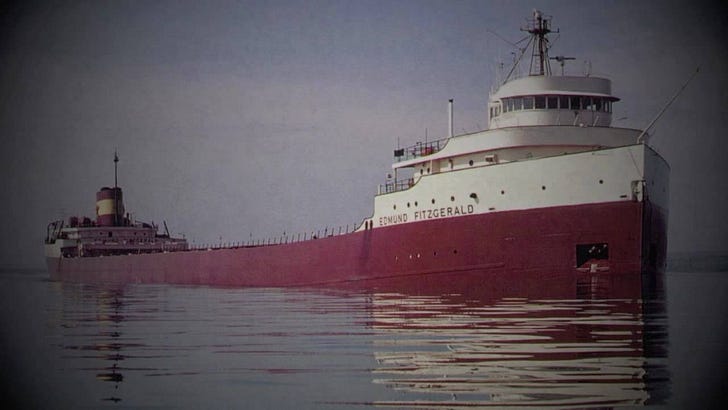
"When the green dark forest was too silent to be real"
Reflections on Gordon Lightfoot's legacy a year after his passing
A Canadian Storyteller Who Helped To Define His Homeland To The World (Gordon Lightfoot 11.17.1938 - 5.1.2023):
One year ago today, the world (and Canada, specifically) lost one of its greatest singer-songwriters, Gordon Lightfoot. Having grown up about 90 miles south of the Canadian border in northern Minnesota, Lightfoot was well-represented on the soundtrack album of my youth.
So much of what he wrote and sang about were uniquely Canadian experiences that translated well to where I grew up. Though there was always a border, it was exceedingly porous, and at 5525 miles long, the US-Canada border is, by far, the longest undefended border in the world.
Southern Manitoba and western Ontario have always received more of northern Minnesota than vice versa, but the cultural cross-over was considerable.
When I was in college in St. Paul, MN, Gordon Lightfoot came to the Northrup Auditorium at the University of Minnesota every year, so I saw him in concert four times. To someone who didn’t grow up in that part of the country, a Gordon Lightfoot concert might not seem like a big deal. Still, there’s an undeniable connection between Minnesotans and Canadians, particularly for those of us who grew up in northern Minnesota.
Perhaps it was the bleak, miserably cold winters when the lakes and most of the rivers would freeze solid enough to park an F-350 safely on. There’s camaraderie that can be found in that sort of shared experience/shared suffering, and people who grew up where I did feel an affinity with Canadians that transcends being able to use loonies in our pop machines.
For Canadians, Mr. Lightfoot was a national hero, a homegrown star who stayed home even after achieving spectacular success in the United States and catered to his fervent fans with constant cross-country tours. His ballads on Canadian themes, like “Canadian Railroad Trilogy,” pulsated with a love for the nation’s rivers and forests, which he explored on ambitious canoe trips far into the hinterlands.
His personal style, reticent and self-effacing — he avoided interviews and flinched when confronted with praise — also went down well. “Sometimes I wonder why I’m being called an icon, because I really don’t think of myself that way,” he told The Globe and Mail in 2008. “I’m a professional musician, and I work with very professional people. It’s how we get through life.”
Gordon Meredith Lightfoot Jr. was born on Nov. 17, 1938, in Orillia, Ontario, where his father managed a dry-cleaning plant. As a boy, he sang in a church choir, performed on local radio shows and shined in singing competitions. “Man, I did the whole bit: oratorio work, Kiwanis contests, operettas, barbershop quartets,” he told Time magazine in 1968.
It was supremely odd to think of one of my musical and lyrical heroes being five months younger than my father. I suppose one could attribute that to the curative power of sex, drugs, and rock and roll, but the culture both emerged from were remarkably similar in many respects.
The direction their lives took, however, couldn’t have been more different.
Gordon Lightfoot saw himself with an almost genetic Canadian humility. There was no self-ascribed brilliance, no appreciation of his place in the musical pantheon of his time. He was a professional musician, recognized his gift and felt blessed to be able to make a living from his music.
Of course, that hardly means he was immune to the temptations and trappings of the rock-and-roll lifestyle prevalent during the ‘60s, ‘70s, and ‘80s. Lightfoot had his issues- with relationships, substance abuse, and the frequent inability to keep it all in perspective.
Later in life, though, Lightfoot managed to straighten things out, and he continued writing and singing almost until he died. His music WAS Canada in a way that no American musician would ever be able to achieve in this country. He may have been a reluctant Canadian icon, but an icon he was.
Over the past few days, his “Canadian Railroad Trilogy” has been running through my mind on an endless loop. Even though Lightfoot first wrote, composed, and performed it in 1966, there’s a pronounced timelessness to it, and it holds up almost six decades later. IMHO, it’s one of Lightfoot’s masterworks, a love song to his native country.
The song was commissioned by the Canadian Broadcasting Corporation (CBC) to celebrate the Canadian Centennial in 1967. "Canadian Railroad Trilogy" describes the building of the trans-Canada Canadian Pacific Railway, the construction work on which was completed in 1885. The CPR was incorporated in 1881 and merged with the Kansas City Southern Railway in 2023 to form the Canadian Pacific Kansas City.
This song was commissioned from Lightfoot by the CBC for a special broadcast on January 1, 1967, to start Canada's Centennial year. Writing and composing it took him three days. It appeared on Lightfoot's album The Way I Feel later in the same year along with the song "Crossroads," a shorter song of similar theme. The structure of the song, with a slow tempo section in the middle and faster paced sections at the beginning and end, was patterned more or less opposite to Bob Gibson's and Hamilton Camp's "Civil War Trilogy," famously recorded by The Limeliters on the 1963 live album Our Men In San Francisco. In the first section, the song picks up speed like a locomotive building up a head of steam.
While Lightfoot's song echoes the optimism of the railroad age, it also chronicles the cost in sweat and blood of building "an iron road runnin' from the sea to the sea." The slow middle section of the song is especially poignant, vividly describing the efforts and sorrows of the nameless and forgotten "navvies," whose manual labour actually built the railway.
Canada’s nationhood didn’t begin with a war against a colonial power from which it desired freedom. Canada struggled against vast forests, mountains, and rivers that effectively separated east from west until the late 19th century. With the completion of the trans-Canada Canadian Pacific Railway, Canada effectively became a much smaller and more economically viable country. Goods from Europe could be easily moved to Vancouver, British Columbia, while goods from the Far East and Canada’s West Coast could be sent east to Toronto and off to Europe.
Remarkably, Gordon Lightfoot captured the history and sentiment of Canada’s first 100 years in a song that, depending on which version you listen to, runs between 7:00 and 7:30. Even more notable is that, at almost 60 years old, “Canadian Railroad Trilogy” sounds like a song that could’ve hit the folk charts last week.
Listening to it makes me realize how little I truly appreciated Lightfoot and his work during the four times I saw him perform while I was in college. I knew little about him, understood even less of his history and background, and had heard only the bits and pieces of his albums I’d heard on the radio.
I knew he was Canadian and that was pretty much it.
Last summer, Erin and I drove up the north coast of Lake Superior from Duluth, MN, to Grand Marais, MN, almost to the Canadian border. The rugged coastline evoked the sort of haunting imagery one might envision from “The Wreck of the Edmund Fitzgerald.”
Yes, Gordon Lightfoot could tell a story.
Now that I better appreciate Lightfoot, his music, and what he meant to Canada, I wish I could see him in concert again. Fortunately, I have almost all of his recorded music and many videos on YouTube.
Today marks one year since his voice was silenced. I feel his loss because of where I’m from and the cultural connection people from northern Minnesota feel with Canada. One can hardly spend any time at all in Toronto without feeling that it’s Gordon Lightfoot’s town, but northern Minnesota isn’t far off.
I remember standing in Nathan Phillips Square when “Canadian Railroad Trilogy” began running through my head. That was when I realized how much Lightfoot had meant to Toronto.
The fact that “Canadian Railroad Trilogy” is still running through my brain no doubt means that I won’t soon forget Gordon Lightfoot, which is as I think it should be.
We’ll not soon see his like again.
All of my posts are public at this time. Any reader financial support will be greatly appreciated. There’s no paywall blocking access to my work (except for a few newsletters), but that remains an option. I’ll trust my readers to determine if my work is worthy of their financial support and at what level. To those who do offer their support, thank you. It means more than you know.

















Jack, this is a truly evocative piece - a heartfelt and thoughtful tribute to a man and musician who helped form the soundtrack of my college years (1971-1975, Michigan State). There was definitely a grandness, nobility, and gentle strength to his writing and performance, steeped in the experience of the challenges of nature and humanity's uneasy journeys. Thank you for sharing your experience of him and his talent with us.
Thanks for this, especially the video essay at the top.